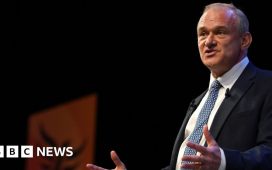State pension on track to rise 4% due to wage increases
Newsflash: UK wage growth has slowed… but pensioners on the new state pension should still be guaranteed an increase of around £460 next year.
The latest UK labour market statistics, just released, show that total pay (including bonuses) rose by 4% in the May-July quarter.
And under the UK’s triple-lock pension pledge, that indicates that the new state pension should also rise by 4% next year.
That would lift the new state pension – currently £221.20 per week – up to around £230 per week, an increase of almost £9 a week from next April.
On an annual basis, it would increase the new state pension from £11,502.40 per year to £11,962 per year, an increase of £460 a year.
The final decision on the state pension will be taken by the secretary of state for work and pensions, Liz Kendall, before October’s budget. But chancellor Rachel Reeves has already pledged the government’s backing of the triple lock until the end of this parliament.
Pay excluding bonuses grew by 5.1% in the year to May to July 2024; including bonuses it was up 4.0%, though this comparison is affected by last year’s NHS and civil service one-off payments.
Read Labour market overview ➡️ https://t.co/LADdyoefyv pic.twitter.com/So7ERyAv1Q
— Office for National Statistics (ONS) (@ONS) September 10, 2024
Key events
Brent crude oil falls below $70/barrel
Newsflash: The oil price has tumbled to its lowest level in two and a half years.
Brent crude, the international benchmark, has sunk below the $70/barrel mark today, its lowest since December 2021.
It’s down 3.2% this afternoon at $69.50.
The selloff follows the Opec group’s decision to cut its forecast for oil demand in 2024 and 2025 (see earlier post). Weaker demand is bad for the oil price, leading to fears of a glut of crude.
Fears that the US economy is slowing, and that China’s economic recovery is faltering, have also hit the oil price recently.
Data earlier today showing China’s imports grew more slowly than expected in August have added to concerns that economic demand there is weak.
As PVM Oil analyst Tamas Varga put it:
“The message from China is simple but loud and reverberates throughout the globe.”
Fed cuts proposed capital requirements for large US banks in half
Speaking of financial stability.…. the US Federal Reserve has cut proposed capital requirements for large US banks by more than half.
The move follows a backlash from the industry and politicians, which has spurred the Fed to rethink how it implements the Basel III international accord that was created after the 2008 financial crisis.
Under its new “re-proposals”, the largest US banks will need to increase their capital by 9%, less than half the 19% originally proposed.
Smaller banks (with assets between $100bn and $250bn) would no longer be subject to the changes, other than recognising unrealized gains and losses of their securities in regulatory capital.
The Fed’s vice chair for supervision, Michael Barr, is announcing the new plan in a speeech at the Brookings Institution, Washington, D.C.
Barr says the plan will result in a “safer and fairer banking system”, saying:
The journey to improve capital requirements since the Global Financial Crisis has been a long one, and Basel III endgame is an important element of this effort. These re-proposals bring us closer to completing the task.
The broad and material changes to both proposals that I’ve outlined today would better balance the benefits and costs of capital in light of comments received, and result in a capital framework that appropriately reflects the risks of bank activities and is tiered to the banking sector. They also bring the proposals broadly in line with what other major jurisdictions are doing.
BoE’s Breeden: We should avoid ‘stability of the graveyard’
Bank of England deputy governor Sarah Breeden has warned against creating the “stability of the graveyard” by building too much protection into the financial system.
Breeden, the BoE’s deputy governor for financial stability, has been speaking at the Wharton-IMF Transatlantic Dialogue in Washington DC.
In her speech, Breeden explains that the Bank must ensure that the system provides vital services even as shocks occur, to ensure sustainable economic growth continues.
In doing so, we must avoid the stability of the graveyard, she says, explaining:
To maintain financial stability, we have to mitigate externalities, where market participants don’t consider the impact of their actions on other participants. For example, a lender might have an incentive to lend more because their lending is secured by an asset, not considering that the borrower might have to quickly sell other assets to meet repayments if a shock hits, reducing the prices of assets held by others. Externalities can lead to fire sales, runs on financial institutions, and a worsening of economic shocks.
Of course, one way to bring about financial stability would be to try to build so much resilience in the system that, as a byproduct, very little activity occurs. A previous Chancellor called that outcome the ‘stability of the graveyard’. That wouldn’t be optimal because it would directly limit the provision of services and damage the economy even in the absence of shocks. And so accountability for our actions and considering their costs as well as their benefits are important parts of the statutory regime.
[That previous chancellor, incidentally, was George Osborne]
Breeden also produced this image, showing the Bank’s approach to financial stability:
The chief executive of NatWest believes the UK economy has reached an “inflection point”, helped by improving customer confidence and stability.
Paul Thwaite is speaking at the Barclays Annual Global Financial Services Conference in New York, and reports that 2024 has been stronger than expected.
Thwaite tells the conference that economic indicators, such as GDP and house prices, over the last eight to ten months have been better than people expected.
NatWest have seen the impact in improved customer sentiment data – although this improvement is from a low base, he points out.
Thwaite says the operating environment is also “encouraging’, citing a recovery in mortgage volumes especially in the last two or three months.
Plus, July’s general election has delivered a “decisive outcome”, Thwaite adds, and one that came earlier than many expected.
If you put the economic, operating and political environment together, it feels like “those dynamics have settled”, Thwaite continues – which is reflected in how its clients and customers feel.
Tomorrow morning we’ll get the first estimate of UK GDP in July, which is expected to show that the economy returned to growth during the month.
Opec trims forecast for global oil demand
Oil cartel Opec has cut its forecast for demand this year, and next year.
In its latest monthly report, Opec has trimmed its estimate of world oil demand growth in 2024 by 80,000 barrels per day, to around two million barrels per days.
The cut reflects “actual data received year-to-date”, Opec says.
The forecast for world oil demand growth in 2025 has been lowered by 40,000 barrels to 1.7 million barrels per day.
#OPEC September oil market report
oil demand growth in mbpd
2024 cut by 0.08 to 2.03
2025 cut by 0.04 to 1.74non-OPEC+ supply growth in mbpd
2023 base raised by 0.07
2024 unchanged at 1.23
2025 unchanged at 1.10OPEC+ crude production rose by 304kbpd m/m to 40.655mbpd in…
— Giovanni Staunovo🛢 (@staunovo) September 10, 2024
Opec lowered its forecast for energy demand despite slightly lifting its forecast for world economic growth this year, to 3%.
James Cockett, senior labour market economist for the CIPD, is concerned that UK youth unemployment has hit a three-year high of 13.3%.
Cockett points out that there are now almost half a million 18-24 year olds unemployed (out of a UK total of over 1.4 million).
Cockett says:
“Whilst overall unemployment levels have fallen, it’s concerning that youth employment has reached its highest level in over three years.
It’s important proposed changes to strengthen employment rights are subject to proper consultation, to ensure they don’t add to the cost or risk employers face in employing staff as this could deter firms from recruiting young people who typically require more development.
BMW cuts guidance due to braking system problem and weak demand from China
Newsflash: German carmaker BMW has cut its financial guidance for the current financial year, blaming “muted demand in China” and a problem with its braking systems.
BMW says that a problem with an Integrated Braking System (IBS) provided by a supplier has forced it to stop some deliveries, which will have a “negative worldwide sales effect” in the second half of the year.
Over 1.5 million vehicles are affected by the IBS problems, and will lead to additional warranty costs for BMW.
Weak demand from Chinese consumers is also hitting BMW’s sales.
It says:
In parallel to this effect, the ongoing muted demand in China is affecting sales volumes. Despite stimulus measures from the government, consumer sentiment remains weak.
BMW now expects its earnings before tax to “decrease significantly” this year, worse than its previous guidance for a slight fall, with profit margins lower than hoped.
Shares in BMW have dropped by almost 7%.
OUCH! BMW cut its guidance for the year, saying a faulty braking system from a supplier prompted the recall of 1.5mln vehicles. BMW’s shares fell as much as 7.1%, the biggest intraday decline since March 2022. (BBG) pic.twitter.com/zYsTyAR57w
— Holger Zschaepitz (@Schuldensuehner) September 10, 2024
Students Loans Company warns students to be vigilant of smishing scams
Students have been warned not to fall victim to criminals who use SMS or text messages to entice recipients to click on phoney links.
The Students Loans Company (SLC) says today that scam emails and text messages – known as ‘smishing’ – are currently the most popular form of scam, and are urging students to be vigilant [difficult during the delights of Freshers’ Week…].
Smishing involves students being asked to click a link to complete a task – for example verifying bank details or confirming their personal information. – so that scammers can divert money to their own bank accounts.
Scammers target students at this time of year, the SLC warns, because they receive their first maintenance loan payment.
SLC is expecting to pay £2bn to students over the autumn term. Last year, it says, it stopped £2.9m of maintenance loan payments being taken by smishing and phishing scams, where students received and acted on false communications.
Alan Balanowski, risk director at SLC, advices student who receive a suspicious message should delete it and report it immediately.
Balanowski says:
“Starting or returning to university is an exciting time, but it’s also busy, with students getting organised and set-up for the academic year, which includes dealing with information from different organisations, including ourselves.
We aim to ensure our payment process is simple for students, but we do experience a rise in smishing scams at this time of year. This means students need to be alert to any potential attempt to intercept their maintenance loan instalment.
Martin Lewis of MoneySavingExpert makes an important point – not all pensioners will get the full state pension, so they’ll receive a smaller rise in April.
Those who are also losing their winter fuel support will face a financial squeeze, he warns:
Lewis explains:
The full state pension rise is for those who get the full state pension. There are up to 800,000 of the poorest pensioners who get less than the full state pension (£11,400 a year) who aren’t claiming pension credit and will miss out on the winter fuel payment even though they should get it.
They are very hard to reach and will be under huge financial pressure. These are therefore people the govt said should be helped but due to difficulties in the system won’t be. These are the people I’m most worried about, some of whom may end up choosing between heating and eating.
Good news. The full ‘new’ state pension is to rise £460 a year next year due to the triple lock. That is a real rise of about £200 above inflation. Yet there are 2 things I’d point out in the context of the debate about the winter fuel payment.
1. That starts next April. This…
— Martin Lewis (@MartinSLewis) September 10, 2024
“End of an era” in the City as Centamin agrees takeover
There’s a flurry of takever drama in the City this morning, where mining company AngloGold Ashanti has agreed a deal to buy smaller rival Centamin.
Shares in Centamin have jumped 25%, to the top of the FTSE 250 leaderboard, while AngloGold Ashanti are down 6% in premarket trading.
AngloGold has agreed to pay $2.5bn in cash and shares for Centamin, which owns Egypt’s largest gold mine, called Sukari.
The deal means the London stock market will lose another member.
AJ Bell investment director Russ Mould says it’s the “end of an era” of large and medium-sized gold miners on the UK stock market.
“Centamin is one of the last pure-play gold producers remaining on the London Stock Exchange. While there are plenty of tiny exploration companies hoping to strike it rich, few have enjoyed Centamin’s level of success and built a large-scale operating mine.
“Over the years, gold producers of any notable scale have been snapped up by rivals or merged with others, leaving investors with limited options on the London Stock Exchange and effectively making them look at overseas stock markets for a broader range of gold miners.
US small business optimism weakens
Over in the US, optimism among small firms has dropped as bosses fret about inflation.
The Small Business Optimism Index, calculated by the National Federation of Independent Business (NFIB) fell by 2.5 points in August to 91.2.
That wipes out July’s gain, and is the 32nd month in a row below the 50-year average of 98.
NFIB’s Uncertainty Index rose to its highest level since October 2020, with nearly a quarter of business owners saying inflation was their top small business operating issue.
“The mood on Main Street worsened in August, despite last month’s gains,” said NFIB chief economist Bill Dunkelberg, adding:
“Historically high inflation remains the top issue for owners as sales expectations plummet and cost pressures increase. Uncertainty among small business owners continues to rise as expectations for future business conditions worsen.”
Nearly £10bn has been wiped off the value of AstraZeneca after it reported disappointing trial results for a lung cancer drug.
Shares in AstraZeneca, the most valuable company on the London stock market, have dropped by 4.8% this morning.
They fell after detailed results from one of AstraZeneca’s key lung cancer trials released on Monday showed that its experimental precision drug did not significantly improve overall survival results for patients in the trial.
The overall survival, or OS rates, in the TROPION-Lung01 trial “did not reach statistical significance”, the company said in a presentation at the World Conference on Lung Cancer in San Diego.
That’s a blow to hopes that Astra’s Dato-DXd drug would significantly improve survival rates.
AstraZeneca $AZN and Daiichi Sankyo’s Phase 3 trial of datopotamab deruxtecan (Dato-DXd) for non-small cell lung cancer (NSCLC) did not meet statistical significance for overall survival improvement versus chemotherapy.
While the drug showed a 2.3-month improvement for patients…
— Wall St Engine (@wallstengine) September 10, 2024
Reuters reports:
The late-stage trial has been closely watched by investors and by analysts who forecast that the drug, known as Dato-DXd, could potentially be another best-selling medicine for the company.
The trial compared the two treatments — AstraZeneca’s drug and chemotherapy — of patients whose non-small cell lung cancer had returned after one or two prior treatment attempts.
This has knocked AstraZeneca’s value down to £187.6bn, down from £197bn yesterday.
GB News investor Paul Marshall seals £100m deal to buy Spectator

Mark Sweney
In the media world, Sir Paul Marshall has sealed a £100m takeover of the Spectator magazine.
The move means the backer of GB News completes the next stage of his ambition to control a significant swathe of the UK’s conservative and rightwing media outlets.
Today’s labour market report shows a clear slowdown in nominal wage growth in the last year, even as real wages recovered (thanks to falling inflation).
Total nominal pay in May-July 2023 grew by 8.3%, more than twice as fast as the 4.0% recorded this morning.
Recruitment and Employment Confederation (REC) chief executive Neil Carberry, says there is a clear slowdown in pay growth:
“The slowdown in pay is quite clear now, despite the effects of awards in the public sector this summer. This should give confidence to the Bank [of England] on the future path for interest rates. Lower cost of capital could also drive confidence in business to invest.
Goldman: Reeves to raise taxes by at least £15-20bn per year
Goldman Sachs have predicted that Rachel Reeves could hike taxes by up to £20bn per year in next month’s budget.
In a new research note this morning, Goldman analyst James Moberly explains that the Labour government faces “a challenging fiscal outlook”. That, he says, is because the UK faces “significant in-year spending pressures” in the current financial year, and because planned spending growth in future years “looks too low”.
This indicates that spending may need to be around £25bn a year higher than budgeted for in Labour’s manifesto by the end of the Parliament, Moberly has calculated.
And that, he tells Goldman’s clients today, means increases in taxation are also likely to be required – worth “at least” £15-20bn per year.
Moberly explains:
Given that the Chancellor is likely to want to leave a somewhat larger margin of headroom than the Conservatives did in recent fiscal events, we expect that the government will aim to raise at least £15-20bn per year in additional receipts on top of the tax increases announced in the manifesto.
Moberly adds that the government could benefit if the Bank of England slows the pace of its bond sale programme (quantitative tightening, or QT) this month. Lower losses from QT could free up billions of pounds of fiscal space against the debt target.
Alternatively, Reeves could reduce the effect of the losses on the public finances by around £15bn by changing the debt rule to target headline rather than underlying net debt, he suggests.














